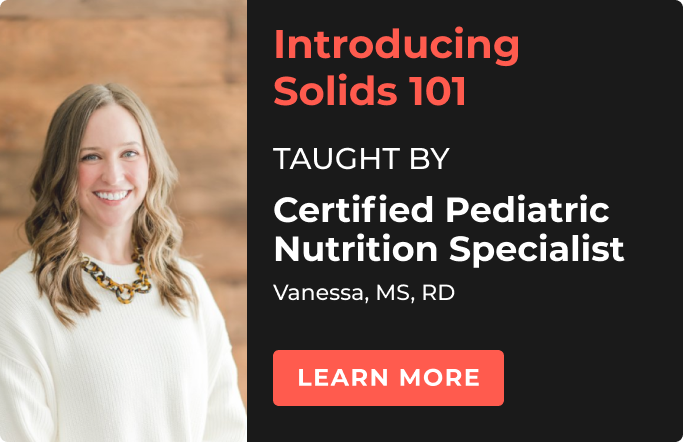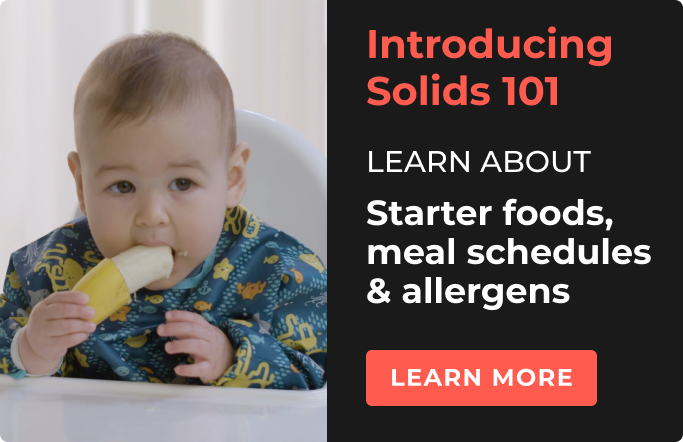1. Wait, what’s going on?
Maybe you’ve seen some articles with intense headlines regarding toxic baby food. In November, Congress investigated claims of high levels of heavy metals in baby foods and released a report last week. It included some scary findings about the levels of arsenic, cadmium, lead and
mercury in processed baby foods sold by certain brands.
2. What are toxic metals?
Well honestly, most things are toxic in large enough doses (even vitamins!). This report is about that list above—arsenic, cadmium, lead, and mercury—which are all heavy metals. The amounts they’ve found in baby food are higher than generally recommended but are still very small. The concern is that these tiny doses can build up over time, eventually adding up to a dangerous level.
3. What are the effects of eating food containing heavy metals?
Studies have linked heavy metal exposure to cancer, chronic disease, cognitive problems, and behavioral issues. But, it’s important to remember these studies observed very large amounts of heavy metal exposure over a significant amount of time, which isn’t really the same as the small amounts of baby food a child ingests in the first years of life.
4. What foods contain heavy metals?
Just a handful of brand-name processed foods were the focus of this study, but all processed baby foods likely contain heavy metals. That goes for whole, unprocessed foods, too. Although this investigation was limited, we can assume all foods contain heavy metals because we know how they’re absorbed. Heavy metals are in the ground, in water, even in the air, and that means they’ll affect anything grown in soil—including homegrown or organic foods. We can also guess that processed foods might contain a small bit more because sometimes the methods of processing can expose foods to more heavy metals.
One of the bigger red flags of the report was the emphasis on arsenic in rice-based foods like cereal, puffs, and rice cakes. Those arsenic levels aren’t unique to baby food—regular, adult rice has been found to have arsenic, too. It’s easy to skip on the rice puffs, but finding a substitute for rice in family meals can be harder, especially for families who rely on rice as a central component of their diet. If rice is a staple in your culture, you could opt for white rice over brown rice (white rice was shown to have lower amounts of arsenic), and prepare it with a special focus on removing some of the arsenic in the boiling process. You can boil your rice in six times more water than usual and dump out the excess (which will also dump some of the arsenic). Or, you can parboil your rice, pour out the water halfway through, and then add fresh hot water to finish cooking. Plus, you can focus on building variety into the rest of your plate, which will give your body the nutrients needed to prevent the absorption of heavy metals.
5. Well, what should we eat then?
Variety and moderation are still the key! This report is a reminder that no food is perfect, and the foods in this study still offer the same benefits they always have: gut health, bone and muscle development, brain development, and disease-fighting.
On top of that, a varied diet helps to prevent your body from absorbing too much heavy metal. Important vitamins and minerals like iron, calcium, zinc, and vitamins B, C, and E have been linked to decreased heavy metal absorption. A well-balanced diet with fiber, protein, and fruits and vegetables will already offer these key nutrients.
Follow all of the same guidelines you already know for offering your kids the foods they need to stay healthy, and you’re set. Limiting processed foods and skipping juice might help avoid a bit of extra heavy metal, but these have always been good ways to protect teeth and avoid the sugar linked to diabetes and obesity. Give your kids variety within food groups, and be sure you’re feeding your kids often (about three meals and a couple of snacks a day) because empty tummies absorb more metal. See? Nothing has changed; you’ve already got this.
6. Is there any good news?
We all got a good reminder to focus on the basics of a healthy diet. Though we have some new information and a little more motivation, the goal is still the same: feeding our kids a variety of mostly unprocessed foods at regular intervals in the day. A well-balanced diet will naturally keep metal exposure in check, while also providing your kids with the nutrients they need to fight the potential harms of heavy metals.
If you’re reading about congressional reports on baby food, chances are you’re already giving a lot of thought to ensuring your kid has a balanced diet. That means you’re already doing just what you need to keep your kids healthy and strong. That’s great news!

About our Expert
Vanessa Thornton is a Certified Pediatric Registered Dietitian who has been in practice since 2011. She has a master's in Nutrition, a Specialist Certification in Pediatrics, and a Certificate of Training in Childhood and Adolescent Weight Management Vanessa completed her dietetic internship at a teaching hospital affiliated with Harvard Medical School and Tufts University School of Medicine.



